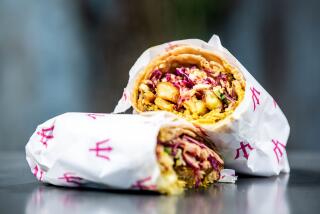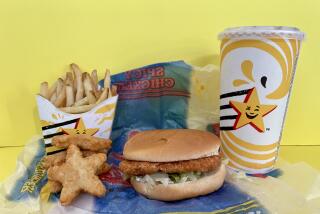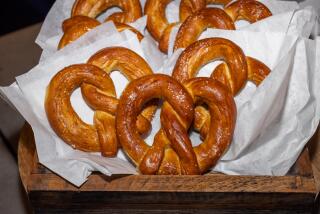For Midwest Burger Fans, It’s Like Going Home
During a recent lunch hour, the chairman of one of the Southland’s largest companies swung his Mercedes-Benz into the Coastal Castle fast-food restaurant in Garden Grove and ordered a bagful of the palm-sized, 39 burgers.
“You’re either addicted or you’re not . . . I’m addicted,” confessed the chief executive, a former Midwesterner who used to have similar White Castle hamburgers flown to his Orange County office from the company’s headquarters in Columbus, Ohio.
He is not alone. Some customers can scarf down these tiny burgers at near-potato chip pace. And senior executives at Castle King Corp., parent company to Coastal Castle, are hoping that much like the anonymous chief executive, homesick Midwesterners throughout the Southland will soon learn to quell their nostalgic tastes for home by gobbling these unconventional burgers that have developed a near-cult following. What’s more, they are hoping that native Southlanders will catch on to the taste, too.
Not related to White Castle--other than the sound of its name and appearance of its product--Coastal Castle has plans to expand in the next year from its single Garden Grove location to 20 castle-shaped stores countywide. After that, franchises in Los Angeles and San Diego counties are planned. The company has already signed agreements with 10 franchisees and a second Coastal Castle is set to open in La Habra next month.
“I have to give White Castle credit,” said Kenneth H. Clifford, president and chief executive of Coastal Castle. “But White Castle didn’t make that hamburger famous, that hamburger made White Castle famous.”
Unlike conventional fast-food hamburgers that are fried or broiled and then layered with mustard and ketchup, the so-called Castle Burger is steamed and served only with onions and a pickle wedge. Purists eat the burger plain--it is about the size of a small dinner roll and has more nicknames than the Dodgers’ starting lineup. Some folks call it the “slider” while others call it the “four-biter,” “biscuit burger” or “mini-burger.” Customers commonly order three or four and some even buy the frozen 12-pack and cart them home.
But executives at Columbus-based White Castle are unhappy with Coastal Castle’s version of their own famous, formula hamburgers. “We’ve spent 65 years building up a reputation and we do not intend to have other people capitalize on it,” said Gail Turley, White Castle’s director of advertising.
The company has sued two Southern California imitators in the last two years--both of which eventually changed their names and have since folded. Now, attorneys for White Castle are pondering what to do about Coastal Castle. “A combination of the things they do could cause consumers to confuse them with us,” said Rex Heinke, a Los Angeles-based attorney for White Castle, “but we have not yet decided what to do.”
While White Castle decides, Coastal Castle has growth plans that could place 100 franchises statewide over the next five years. Coastal Castle executives are baffled as to why White Castle has refused to enter the Southern California market. But privately held White Castle is “super conservative,” Turley responds, adding that the reason for that conservatism is success. White Castle’s 200 stores are expected to post combined sales of more than $250 million this year, Turley pointed out.
White Castle’s per-store sales were recently ranked tops in the fast food business by the Nation’s Restaurant News. The chain’s average revenues of $1.3 million per store last year even edged out the fast food giant, McDonald’s, which posted an average of $1.23 million per store.
A far cry from that is Coastal Castle, which expects to post pre-tax profits of $74,000 on revenues of $400,000 this year. Even though his Garden Grove store--across the street from a boarded-up Taco Bell--is at “one of the worst locations in Orange County,” Clifford said daily revenues at the store now exceed $1,600.
Its average guest check, however, of $3.60 ranks among the highest in Southland’s fast-food industry. That’s what happens when patrons buy hamburgers by the sack full--then take home another dozen, to boot.
The store--and company--were purchased last July from Leroy Patraw, who founded the operation here as Castle Burger two years ago. As a teen-ager, Patraw worked in a White Castle in Minneapolis, where he was privy to the secret pressurized steaming process by which White Castle cooks its hamburgers.
With an eye on growth, Walt Stegeman--who also acts as marketing director--purchased the operation from Patraw, then hired Clifford to oversee the franchising. But when the company’s executives began to sell franchises under the name Crystal Castle--and advertise themselves as a White Castle clone--White Castle threatened legal action, prompting a name change and a modified ad campaign. “We didn’t want to get tarred and feathered,” said Clifford, a former real estate agent who has no fast food experience.
Still, the company’s slogan, “Home of the little square burger,” reminds customers that its bite-size burgers are shaped much like White Castle’s. That, alone, seems to be enough of a draw that 95% of Coastal Castle’s customers come from outside a five-mile radius of its store, according to a recent customer survey.
Joan Henley, a former Clevelander who now lives in Pomona, drove miles out of her way to stop at Coastal Castle. She sells and services computer hardware for Basic Inventory Control, a Diamond Bar company. “I planned today’s routes around a stop here,” she said at Coastal Castle during a recent noon lunch break. “I’ll have to take some home for my husband. He loves them, too,” she said.
Similarly, David Fehser, a Huntington Beach mechanic who was raised in the Midwest, bought a bagful to take home to his wife. “Back in the 1930s, 25 of us guys would go to the local White Castle and order 100 of these,” he said. Of course, the hamburgers were a nickel each then. His appetite has since moderated; he now only munches two--along with a milkshake.
Less impressed with Coastal Castle is its closest competitor, Original Hamburger Stand, a division of Newport Beach-based Wienerschnitzel Inc. “There’s lots of competition for the low-price market,” said Stan Spicer, the company’s general manager and vice president. “but you must have a good quality product to attract and retain business.”
Although Coastal Castle is just a few doors down from the Original Hamburger Stand in Garden Grove, Spicer says it has not affected his business. Hoping to broaden its market, Original Hamburger, which has 70 locations in 10 states, plans to edge away from hamburgers toward the popular Mexican fast-food segment and sell bargain tacos and burritos for 59 cents each.
Coastal Castle, however, plans to stick with burgers and “Castle Beans,” a baked bean side dish that sells for almost twice the price of the hamburger. The chain might not make much of a profit off a 39 burger, but it can make decent returns from 69 baked beans and 89 french fries and onion rings.
Still, the burger is the draw. Clifford says he can always spot a first-time customer. “They’ll walk up and order one burger. Then they’ll take off the top, examine it and make a face. But after they eat it, they’ll turn around and order four more.”
Some customers go to even more outlandish extremes. On the way to his wedding, one Garden Grove groom stopped at Coastal Castle and ordered 100 hamburgers to go. The newlywed planned to serve the burgers at his reception--and snack on any leftovers during the honeymoon.
More to Read
Inside the business of entertainment
The Wide Shot brings you news, analysis and insights on everything from streaming wars to production — and what it all means for the future.
You may occasionally receive promotional content from the Los Angeles Times.










